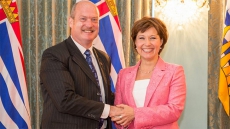VANCOUVER - Now that the initial euphoria from wrangling a negotiated deal has worn off, thousands of British Columbia's teachers are tallying their wins and losses ahead of a crucial vote that could reopen school doors.
"We're ecstatic they were able to sit down and hash something out," said Troy Hardwick, a teacher of 18 years in Vancouver.
"And then you start collecting into groups on the picket lines. God, teachers are terrible," he joked. "Seven teachers and you get eight opinions."
On Thursday, more than 40,000 members of the B.C. Teachers' Federation will be asked to form conclusions.
Votes will be held across the province after the union urged members to accept the proposal hammered out with the employer, that could end the job action that terminated classes for half a million students for five weeks.
The negotiated agreement — something both sides said was the goal — is now being computed and sometimes rationalized, with labour experts saying neither side achieved a strong victory.
"Whether it was worth it is a personal decision on behalf of each voter," said business Prof. Fiona McQuarrie, at the University of the Fraser Valley. "What is probably going to happen is individual members are going to look at what this contract means to them personally, and what they lost personally. I think their vote is probably going to take that into account."

Study sessions will be held Thursday morning for members to obtain more details and ask questions, with the vote results expected in the evening.
The teachers' last contract expired in June 2013.
Breaking down the key provisions reveals both losses and gains.
Term: The six-year, retroactive agreement is the longest ever negotiated and exceeds the five years proposed by the union. A 7.25 per cent salary increase comes in just higher than the average increases given to more than half of other public-sector unions.
Improvements in extended health benefits were achieved, and the teaching-on-call rate of pay gets a boost. Teachers receive no signing bonus.
"It's certainly resolved wages and benefits, and that's going to be a relief to both parents and teachers because they got a six-year term," said labour lawyer Ritu Mahil, with the firm Lawson Lundell.
Education Fund: The union and employer argued vigorously about what to dub the fund meant to address class size and composition issues. Ultimately, they've determined a fund will be used exclusively to hire specialist teachers. The employer had offered $75 million in an existing fund, which will remain stable the first year, and then be bumped to $80 million for three years and $85 in the final year.

Tara Ehrcke, former president of the Greater Victoria Teachers Association and the contract chairwoman for her association, has analyzed the numbers. She rejects her union executive's claims about how many hundreds of hires will be possible.
Because the fund replaces the government's former fund, only an additional $5 million will be available for new hires, resulting in no more than 400 new, temporary positions provincewide, she calculated.
"I'm very disappointed and I'm very concerned," Ehrcke said. "I think that teachers need to take a really hard look at what's there. Because if we do say Yes, it will be five more years of the same conditions that aren't good enough."
Retroactive Grievances: The union will disperse $105 million to settle hundreds of grievances. The issues stem from two B.C. Supreme Court rulings restoring teachers' rights to bargain class size and composition, removed by legislation in 2002. Both the union and government have stated the global resolution ends that portion of the court battle.
But the experts agree class size and composition won't really be tackled until the conclusion of the court case. An appeal is slated to begin in mid-October and could stretch past 2015 if taken to the Supreme Court of Canada. At stake is language giving control over educational policy to one side or the other, McQuarrie said.
Re-opener clause: The contentious E80 clause was removed from the new agreement, with another provision inserted to deal with implications of the ongoing court case around classroom conditions. The proposed contract states that when a final court decision is made, the parties will bargain only over that part of the contract and from the restored language put back in place by the judge if applicable, McQuarrie said.

Mahil said the union's signal that teachers should vote Yes is significant.
"If the leadership, who has gone through that battle on their behalf, thinks this is a good deal, then that's certainly something to take seriously," Mahil said. "This is probably the best deal they could have gotten right now."





